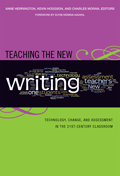Author: Mya Poe and Julianne Radkowski Opperman
Summary: Looking for specific ways to incorporate technology into teaching while leading students through the scientific research process? Noting that writing in science “is a dynamic process that changes quickly with technological change,” this chapter explores specific examples from both high school and college settings that invite students’ dynamic engagement as writers through proposal writing, literature reviews, storying research findings, and peer review. This resource will be of interest to both classroom teachers and those involved in designing professional development programs or seeking ideas for teacher inquiry.
Original Date of Publication: 2009
Excerpt
In this chapter, we explain several major ways that scientific writing has changed given technological advances. We then explain how we have attempted to address these changes in our teaching of scientific writing, for Julianne at the high school level (Greely High School, Maine) and for Mya at the college level (Massachusetts Institute of Technology, Massachusetts). At each site, we incorporate technology into or teaching as we lead students through the scientific research process. In this chapter, we focus on four areas that we have specifically integrated technology into our teaching—proposal writing, literature reviews, “storying” research findings, and peer review.
Related Resources
- How to Build Better Engineers: A Practical Approach to the Mechanics of Text
- The Boise State Writing Project’s Science Pathway
- Composing Science (NWP Radio)
- Disciplinary Literacy and Reading Across the Content Areas
Original Source: National Writing Project, https://www.nwp.org/cs/public/print/resource/4678
